The Holistic Church: An Idea Explored
So I've had some thoughts lately that I really want to share. I'm just going to jump into it because I don't know how to build up to it for an intro. I want to take a holistic look and a holistic issue, so this is gonna get wordy.
Why don't churches have gardens?
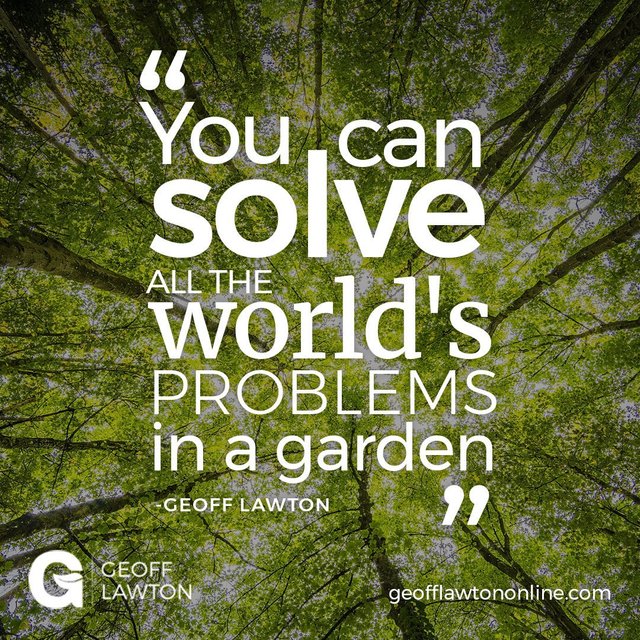
In Texas, we have a lot of churches. The little town I'm in now (I think like four thousand people) has at least ten churches that I can think of off the top of my head. Some big (500+ people), some small (no more than 25 on Easter). And it seems like everyone I meet is a pastor.
Every. Single. Church. Has at least five acres of land sitting unused.
When I see unused space like that, it kinda hurts. Especially a church. Here's a group that's supposedly charged with helping people, and they have a vast excess of resources that sit, unused to the benefit of nobody. It's hard for me not to be angry, but instead I am trying to come up with a solution.
Non-christian friends, y'all bear with me, I'm about to get a wee bit Evangelical. You'll see where we're going.
Genesis 1:15
15 The Lord God took the man and put him in the Garden of Eden to work it and take care of it.
This is the verse before God gives man the first command not to eat from the tree of the knowledge of good and evil. Before God ever told us to do anything, he made man to take care of his garden. His earth. The rest of the project that he created, to use a homesteady analogy.
I may not be the smartest preacher in Texas, but that chronology seems significant.
With that bit being clarified, I want to share a question that someone asked me many years ago that has really resonated with me lately.
"What did you do today to lessen the effects of the fall?"
--Mr. Borah, an elder in the church I grew up in.
To answer that, I've been looking more closely at the effects of the fall. Let's head back to Genesis, this time in chapter 3. I'll italicize the bits I'm going to focus on, as it's a long passage.
Genesis 3:16-24
16 To the woman he said,
“I will make your pains in childbearing very severe;
with painful labor you will give birth to children.
Your desire will be for your husband,
and he will rule over you.”
17 To Adam he said, “Because you listened to your wife and ate fruit from the tree about which I commanded you, ‘You must not eat from it,’
“Cursed is the ground because of you;
through painful toil you will eat food from it
all the days of your life.
18 It will produce thorns and thistles for you,
and you will eat the plants of the field.
19 By the sweat of your brow
you will eat your food
until you return to the ground,
since from it you were taken;
for dust you are
and to dust you will return.”
20 Adam named his wife Eve, because she would become the mother of all the living.
21 The Lord God made garments of skin for Adam and his wife and clothed them. 22 And the Lord God said, “The man has now become like one of us, knowing good and evil. He must not be allowed to reach out his hand and take also from the tree of life and eat, and live forever.” 23 So the Lord God banished him from the Garden of Eden to work the ground from which he had been taken. 24 After he drove the man out, he placed on the east side[m] of the Garden of Eden cherubim and a flaming sword flashing back and forth to guard the way to the tree of life.
I'm not going to write on childbirth or patriarchy vs. matriarchy, as those are some effects of the fall that I'm not qualified to discuss yet (though that would be an interesting topic to flesh out...). I'm going to focus more on the switch from a natural perennial food system to annual agriculture as an effect of the fall that we can work to lessen for ourselves and for others as a form of ministry.
Lessening the effects of the fall: annuals
When I think about Eden, what I imagine is not fertilizer, weed killer, and row crops. What I see is much more like Zaytuna Farm than it is conventional agriculture. It's the smell of rain, not diesel exhaust. It's soil full of fungi, not full of herbicides. Animals are welcome inside this system, not pushed away. This system welcomes visitors, rather than seeking to work autonomously. It's an integrated system, just as God created it, and we were made to manage such a system.
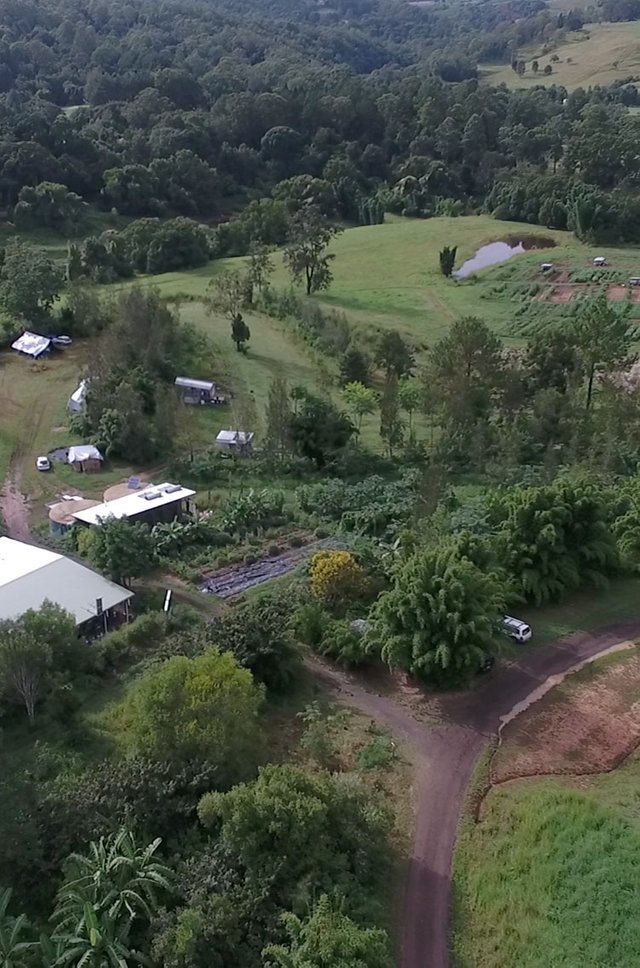
Zaytuna farm Source
At the end of that passage in Genesis 3, I read it as a shift from an integrated perennial food system to one of labor intensive annual supply (the Latin root of the English word agriculture translates to field cultivation... ). From a system that strengthens with age and builds fertility, to one that requires constant tending and artificial inputs.
All this isn't to say there's no room for annuals. I love me come corn on the cob. But a system built entirely on annual monocrops is hardly sustainable.
We've strayed from how things ought to be, and it's making people unhealthy.
At this point, whether you believe in God or not is irrelevant. I obviously do, and that's going to frame my wording, but most people in the permaculture world will agree with what I'm saying.
Nature was meant to be cooperative. It wasn't meant to be compartmentalized like we've done. Soil life has needs, plants have needs, and animals have needs. Industrial farming meets exactly none of those needs, and it's not a system that's in line with our God given purpose here on Earth.
The church is in an excellent position to remedy all of this with regenerative integrated agriculture, and imagine the ministry opportunities! What a benefit it would be for a few churches to start a co-op to provide free good food to their congregation and those outside the church! How many people could be attracted to that level of physical and spiritual nourishment?
Lessening the effects of the fall: health
On Easter Sunday, our pastor spent a good deal of time praying for people that are sick. Specifically people with autoimmune disorders, thyroid disorders, and cancers. These are things that can be stopped and reversed with a traditional, nutrient dense, whole food diet.
Modern medicine has a place. That place is not necessarily inside every single person.
You all know that I feel very strongly about the pharmaceutical industry, and I believe that our food system straying from a natural way is part of their agenda of disease and debt.
What if the church suddenly became a place of physical nourishment as well as a place of spiritual growth that it's supposed to be? How much more could it be if we as a church body came together to embrace the health that a God-designed natural system can create? Health and life, pouring abundantly from us to our community, and going with the blessings of God.
Lessening the effects of the fall: labor
A natural system largely takes care of itself. In an integrated model, there's very little human input after the start. And the abundance increases with precious little input. The effects of the fall were changes. Things that became, that were not the case before. A shift from an integrated system designed by God to a labor-intensive model driven by man forcing his will on the soil.
Is it that hard to believe that health and wellness can spring forth when we return to an approach that's created by the one that made the universe?
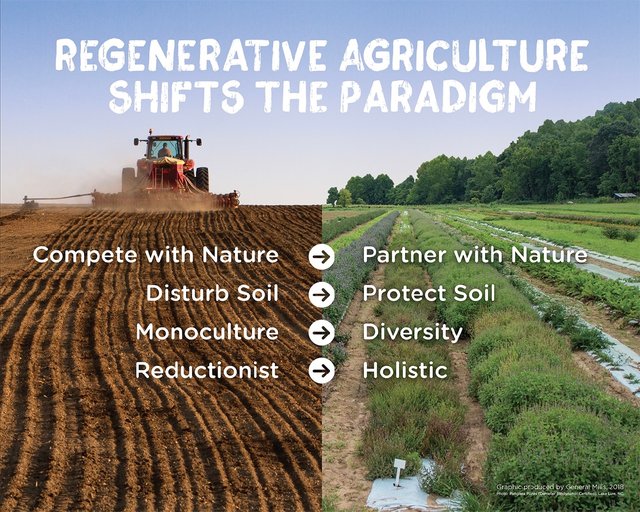
What do I want to see?
In case it's not clear yet, I'd like to see churches embracing permaculture systems. The thought of this much unused land being used in and for communities is awesome.
My mind immediately sees three specific integrated models that a trio of churches could implement:
- First, is a system much like my own. A forest garden with egg producing chickens. The ease of this system increases as it becomes more established, as I've noticed even in the few months since I started mine. Fruit crops, water harvesting, soil improvement, and the high quality protein and fat source of fresh eggs are the main attractions in this system. The balance that chickens bring to the system is three fold: they fertilize, control pests, and eat weeds. Elimination of three outside chemical treatments is a huge value in and of itself. The addition of an egg crop makes the system irresistible.
- A second regenerative system that a church with some unused space could implement is a pastured beef and meat chicken operation like Joel Salatin describes. A tad more management intensive than the first system, with chickens needing moved daily and cattle a bit less often, the benefits here are in the soil improvement and the healthy food that would be made available to the community. The chickens move on a pasture after the cattle, working the manure into the soil better and breaking parasite life cycles to create a healthier system as a whole.
- The third regenerative system also comes from Joel Salatin in the form of forested pork. A system more for a church with a wooded area, putting pigs in their natural habitat can be extremely beneficial to the trees and the quality of the meat. The pigs in this system are encouraged to move: a luxury not afforded to conventional confinement pork. That's what brings about the quality of the meat: natural exercise! The pigs also forage on plants in the area, decreasing feed requirements, breaking pest cycles, fertilizing, and aerating soil.
Of course, there are variations on each theme here; one could pasture cattle in an orchard between tree rows instead of through a plain pasture; one could run guineas in a forest with the pigs and get an egg crop; chickens could follow sheep rather than cattle, and the list goes on.
I did a quick Google search for my town of 6,700 people, and there are seventeen churches here. My family and I, after trying a few churches over the last year have finally settled at one. As soon as we're more embedded in the community, I intend to talk with the pastor about evangelizing and lessening the effects of the fall using permaculture systems to regenerate the earth and tend it as God intended.
I intend to offer my time to the project for free because I believe in this cause. Volunteer work is something I've been thinking about a lot lately, and I'll write a more in depth post about it soon, but it's something that's an increasingly encouraging prospect in our time. We'll get to it more as we flesh out this topic.
Thanks so much for reading all that! If you think this is a cool idea, drop me a little vote and let's talk about it. This idea has been bouncing in my brain for a while, but this is the first I've shared of it publicly. There's a lot to flesh out, and a lot of work to be done, but here's the idea :) I hope someone else can find it valuable.
All action for the good of all,
Nate.
P.S. Here's some aerial shots of a few local churches for reference. I tried to keep identifying factors out of the pics so as to avoid drama in the future. Lookit all that space!
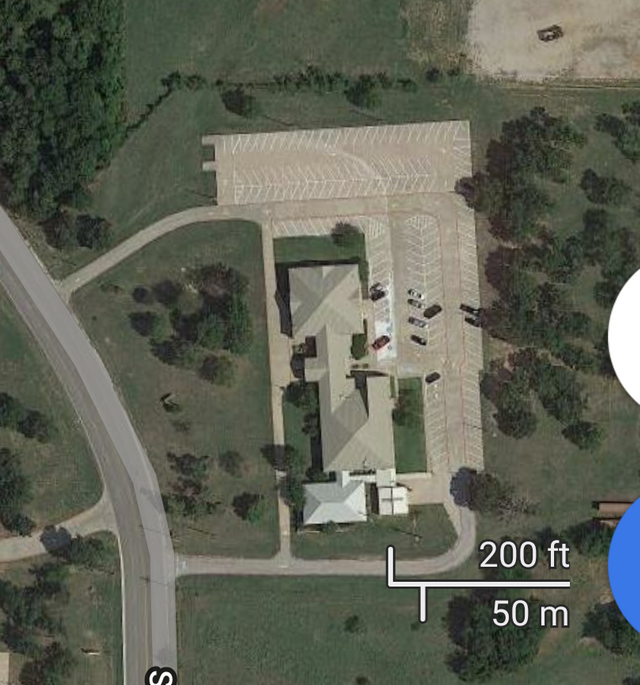
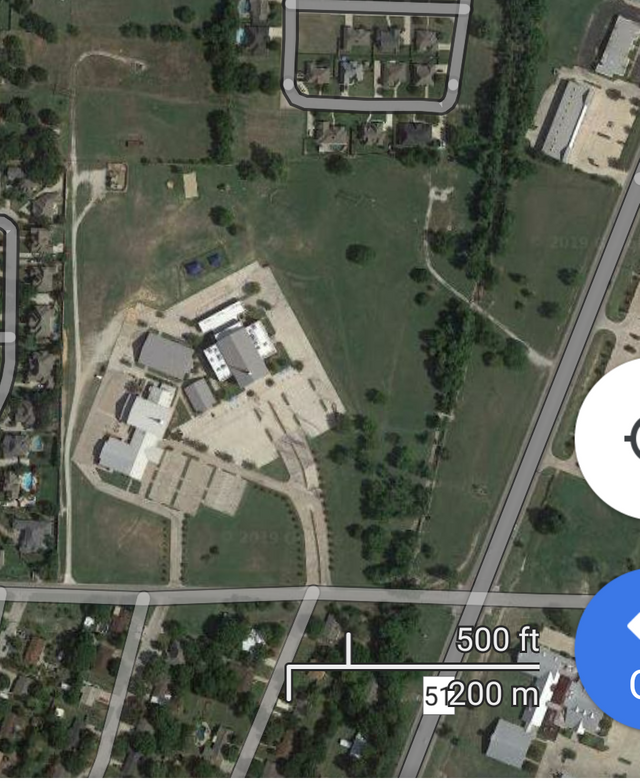
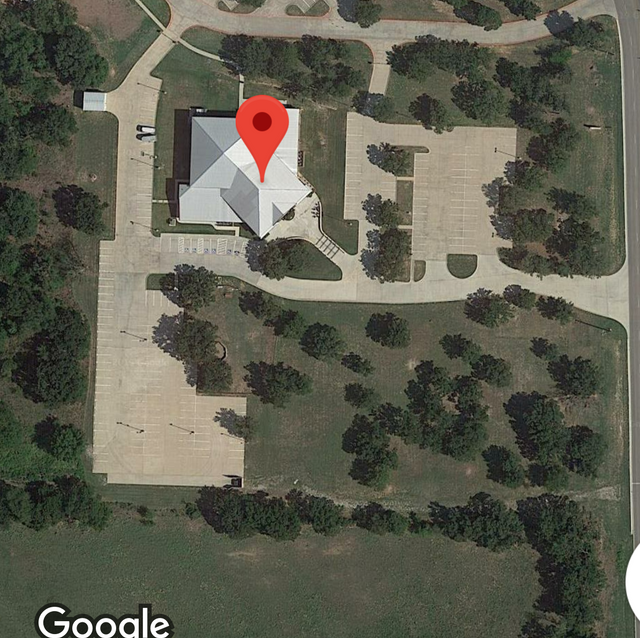

Purchase sustainably produced seeds, textiles, medicines, and more for SBD from @homesteaderscoop at The Homesteader's Co-op Online Marketplace!

Follow @naturalmedicine and join the Natural Medicine discord channel today and come grow and learn with us!
Adelaide is supposed to be the city of churches, but I'm pretty sure I've never met a pastor (or priest as it would be here). Most churches here don't have much land with them, unless they're out in the sticks and many of them are long abandoned.
Anyhow, this reminded me of River Cottage and Hugh Fearnley-Whittingstall in the UK. Have you heard of them over there? In one of his episodes he covers a church where pike are growing food in part of the (ahem) graveyard. Most of the land in old churches there is graveyard. I'm pretty sure there were no fresh burials in that one, however.
I'm not religious, but I find it sad that the church has been losing its reputation for being the carers, the place that always offered sanctuary and help for those in need. Growing nutritious food for their people would certainly bring some of that reputation back and be fitting of those Christian values I was always taught about as a child.
Posted using Partiko Android
Graveyard gardens could be neat!
Washington state just legalized human composting, which is really exciting to someone like me that has a big problem with being embalmed in preservatives and encased in concrete where my nutrients won't be bioavailable to anything ever again.
Ooh, this post is opening up a lot of fun rabbit holes!
Posted using Partiko Android
Now that conjures up visions of composting humans begging turned in the heap. 😨 I've never been keen on the embalming and burying idea, either. Cremation not so bad. I rather like the idea of having a tree planted over me, maybe in fetal position. Now I'm curious about what the official way of composting people is.
Posted using Partiko Android
There's a place by my cousin's home where, it's a crematorium but they have acres and acres of land they use as a "graveyard" but instead of graves people chose a tree to plant there.
And as for green burials and not being all pickled im harmful preservatives or boxed into concrete fortresses... I think you may like this interview:http://www.danielvitalis.com/rewild-yourself-podcast/mark-harris-on-grave-matters-and-green-burials
Have you seen these things? This is what I want. Can you imagine walking through a forest and realizing that each tree literally represents one of your ancestors; looking around and knowing that your ancestry is literally a part of every living thing in that forest?
That's amazing!!! I need to send my wife that. It's perfect! "Trees instead of gravestones!"
Posted using Partiko Android
Oh my.. it is so true. All that space could be used as intended! What a great idea it would be to turn all that into food and bio-diversity.
Imagine if they did seed saving with the project too! They'd have seeds for replanting, and enough to share with the community too! From abundance to abundance.
Posted using Partiko Android
I think that's where people get stuck... they don't see that there is abundance everywhere. Instead they're sold into believing a life a scarcity is wherw we are in history.
First let me say this, as a Christian and as a believer in natural, healthy and holistic living this post really resonated with me. The way you partnered up your ideas with scripture was wonderful. I also want to add that I appreciate you staying in context of the Word. Many read out of context which creates a huge mess which leads to false beliefs. Sadly the “church” has a bad rep because many claiming to be Christians don’t walk according to God’s word. Also some claiming to be Christians will be the ones that hear these words from the Lord...
Also what many don’t realize is that the “church” is the body of Christ not a building. We shouldn’t be so stuck on building up the four walls of a church building but instead building up one another as well as the communities around us.
This idea that you have shared would bring in so many ministry opportunities as you have stated. Helping with the spiritual and physical needs of our communities is so essential. While reading this post I was already thinking of ways to bring this to our church leaders.
My husband and I have tossed the idea around of starting a community garden within our neighborhood. A shared place where families can have a supply of fresh healthy foods. People wonder why cities/governments won’t supply public gardens or place fruit trees in parks...it’s because that wouldn’t fit their agenda. Sadly the goal and agenda is to keep us sick and unhealthy so we will continue to depend on commercial medicines and hospitals. If we start coming together more as a community to grow our own foods there will be less cancers and disease caused by contaminated foods being sold in stores. God has given us everything we need to survive and live healthy lives we just have to be willing to do the work to reap the benefits.
I am glad you shared your idea in the open, thank you for outlining it and putting the thought into our brains as well. It’s great to know you are a fellow Christian :) Great post! Upped and Resteemed!
Thanks so much for the support @crosheille!
I think you're right about the ministry potential. The church today is really not what I think it should be (not that I can judge lol). There's too much focus on far away things on a grand scale, and not enough at home in the church's own neighborhood.
I hope you can make some progress taking it to your own church, that's a really exciting idea to me. I'll be developing the idea more in the future, as this is just the beginning :)
Posted using Partiko Android
You are very welcome ;)
Looking forward to seeing your ideas unfold :)
Posted using Partiko Android
Yep, why aren’t all public lands/commons used to grow food? Why don’t our public parks have fruit trees that anyone can help themselves too?
I would like to add an onion to the ointment and say that cropping led to higher levels of nutrition which increased brain capacity as well as physical activity capacity... I guess depending on your outlook that’s either a good thing or a bad thing...
😊🙏🏽☯️
Posted using Partiko iOS
Cropping now does just the opposite though, unfortunately.
And I agree with the public lands and parks! That enormous space between the sides of the highway could be planted with trees to sequester some of those damn emissions! And larger, less busy bits could totally be made into small communities for the homeless. There's so much good that could be done with this senselessly wasted space!
Posted using Partiko Android
This post was shared in the Curation Collective Discord community for curators, and upvoted and resteemed by the @c-squared community account after manual review.
@c-squared runs a community witness. Please consider using one of your witness votes on us here
Thanks for the support! :)
Posted using Partiko Android
As you know, I don't believe in God. But I do believe in community, the Earth, and holistic living, and I do believe that churches can be wonderful places to unite people under a shared goal... hopefully, love. I think I'd almost want to join a church if they did this kind of thing. I love your idea and I think the idea of man redeeming himself after being kicked out of Eden sounds like a great idea. Get thee to your pastor... let us know how it goes!!!
Yes, yes, yes and yes. A great post Nate..xx
Posted using Partiko Android
We're probably a bit off from that. Haven't even become official members yet, but we're going to the next time they have a new members class.
I love that you mention you might wanna go to this kind of church. From an outreach perspective, this represents a huge opportunity to bring more people to church, and to Christ. The church as a whole has a bad name to non christians and I think that's partially because it's lost touch with the community in a holistic sense.
Posted using Partiko Android
Exactly. And I have no problem with the church in this form! Look, I'm never going to believe, but I can believe in people and the capacity to unite and do good. If I'm ever in Texas....
Posted using Partiko Android
On the note of people coming together, that's kinda what the church is supposed to be, ain't it? Here's a joint with ten grand a month in revenue (just guessing) from donations. If that money isn't going back into the community, where the hell is it? I'm not talking about building additions or paying for big ol salaries here, I'm talking about things that benefit the community, the whole! Not just the people paying into the ministry, but the people outside that might benefit from a cucumber patch or a peach tree.
I'm curious how many people in the community could be reached with a free garden fresh breakfast a few times a week ;) that would be cool to see.
Posted using Partiko Android
I soooo want you to write this all up and pitch it to your pastor just like this. I'm sure once you settle in to your new church they'll go for it. X
Posted using Partiko Android
I don't see how they wouldn't go for it, but I'm a bit biased lol
Posted using Partiko Android
I think this is the kind of idea that could change the way the world views "The Church". I grew up in a small, poverty-ridden town. In the church that I was raised in, people from around the community were always asking for donations of food and other items. The congregation would always do what it could; there just weren't enough resources to go around.
I strongly believe that it is "The Church's" job to provide for those who are in need, both spiritually/emotionally and physically/financially. Unfortunately, we as Christians have focused on the spiritual aspect and have neglected the physical needs of our fellow men and women. That is why we have such a strong need for a government welfare system here in the US.
This has been one of the most eye-opening posts that I've read in a long time. I agree with you 100%! If churches would adopt this sort of practice, it would be world-changing. Healing man while healing the land.
Earth care, people care, return of surplus. That's what permaculture is at it's core, and it's really what the church should be about too. I'm glad you enjoyed the post :)
Posted using Partiko Android
Fabulous post, @nateonsteemit, and I agree wholeheartedly.
Where are you located in Texas? If it rarely freezes where you are, I hope you're growing chaya and moringa, which are two of the most amazingly productive and nutritious plants on the planet.
I already knew we were kindred spirits, and this post proves it. When I lived in Florida, I tried to talk several churches into putting in food gardens for the poor, along with offering them plants, seeds and other resources, and would you like to know how many took me up on it? Precisely zero. Sigh.
I also tried to talk numerous businesses into doing same, with one taker . . . Morning Star Fishermen, in Dade City (actually San Antonio), which is the aquaponics company from whom I earned both of my aquaponics certificates.
I gave them a couple dozen chaya cuttings, along with a bunch of different seeds, and the last time I visited, some plants from those seeds were still growing in their main system. The chaya all died though, as they didn't protect them from freezing.
I even tried to talk Pinellas County into allowing me to plant chaya all along the Pinellas Trail, which runs the length of the county, but the usual brainless automatons failed to even come to a decision.
I should have just planted the things and said nothing. They'd be massive by now, and could be feeding lots of people, homeless and otherwise.
All that aside, I also heard of several churches already running church gardens, a few churches encouraging their congregations to "plant a row for the homeless," and one group of churches in the Naples area that had organized and set up an actual food bank, that an elderly lady friend of Marek's volunteered at regularly.
School gardens are another amazing use of previously fallow land, and entire curriculums could be built around what goes on in the garden, especially with the addition of permaculture, chickens, and/or an aquaponic system. They could literally be teaching reading, writing, arithmetic, history and much more, as it relates to what they are seeing in the garden.
Talk about getting kids excited about learning!
Montessori has already done some of this, and Morning Star Fishermen has a grade school curriculum available which relates to aquaponics. It is entirely doable.
We're in wise county an hour north of Fort Worth. It does freeze here yearly, though not as bad as other places. Zone 8a, which I think is down to 10°F.
I do keep returning to the educational benefits of such things too! Kids could learn about all kinds of natural processes when it was incorporated into homeschool programs! There could be farming courses too, that could help the kids learn business skills before graduating.
Lots of potential!
Posted using Partiko Android
Absolutely!
Hell, I was still in high school when I remember talking to my mom about the possibility of using an organic farm and orchard (in the days before I'd heard of forest farming or permaculture) as a staging place to teach marketable skills to at-risk kids, and people coming out of jails or prisons.
And I actively tried to find partners in Florida to provide a small aquaponics system to individuals and families coming out of shelter situations.
Unfortunately I was unsuccessful, but it is still something I'd like to take part in, as if you give people a viable way to feed themselves well, and teach them the skills to do so on an ongoing basis, you give them basic skills with which to at least augment if not replace and increase their income, and a way to improve their lives and health in a real and meaningful way.
There is so much that could be being done, without spending a fortune, and if these things occurred to me as a teenager, what the heck us our government's excuse?
Posted using Partiko Android
We're in Zone 7a, so colder than you, but you could definitely grow chaya and moringa with winter protection.
Not to mention a zillion or so other amazingly nutritious and beneficial plant foods.
My dad was born and raised in Honey Grove, in Fannin County, which is about twenty miles due east of Paris, so a similar climate to yours.
And my eldest sister still lives in a Houston suburb.
This past winter was by far our warmest since we've been here, with a low temp of 14 degrees, but in the three previous years the low temp was minus 3. Brrrrrr.
Too cold for this Sunbelt kid. ;-)
Y'all need to get out and about a weeny bit more. :) In Thailand the temple gardens are amazing - large meditation gardens, massive trees, herbs and vegetables, cool places for travelers to relax & enjoy, and blessed with fruit trees to feed to poor people round about. Temples here ARE living communities, usually with chickens wandering about and with a beautiful sense of spirit meets earth. The monks sweep and tend the gardens as meditation, which is as it should be.
But yes, I love your vision for juicing up the barren land around western churches. Actually, only half of them should become permaculture farms. The other half should be sold and the money used to redress the many abuses supported and condoned by the church. But that's maybe for discussion in another post. ;)
Leading the curation trail for both @ecotrain & @eco-alex.
Together We’re Making This World A Better Place.
Click Here To Join the manually curated trail "@artemislives" to support quality eco-green content.
@ecoTrain
Can't say I disagree about scrapping half the churches lol there's a whole lot of them, and I do find it excessive. That's a lot of property that could be used productively as a school or farm or other business. It would bring people more together too, not being divided up into seventeen churches (who are likely at each other's throats over doctrinal minutiae) on Sunday!
As for the temples you describe, that sounds like a good model! Gardens are really great places for prayer and meditation.
Posted using Partiko Android
One of my bizarre dreams is to create a community location with almost a religious calling to become cultivators of the forest and plants to sustain animals and people. A zeal for holistic plant healing as a starting place for healthy development would be the nucleus to prevent toxic diseases. My thought was that this type of organization would require some sort of agricultural profit-making system, or the funding from donors willing to support the creation of a financial trust to sustain it into the future.
The focus should not be on expanding profits, but to become a hotspot of overflowing free resources. A place with the capabilities to regenerate growth and healing.
This plan of yours seems to fit in well with already existing churches. Some churches lose sight of the base things, as you described, as they might feel that outreach and expansion of the congregation and building outweighs the importance of being active stewards over creation.
With a wise pastor who sees the future in much the same way, perhaps you can make it work.
That's what I'm kinda going for here. I'm actually writing a post now about the sustainability of volunteer work. It's been on my mind lately too. Give it a couple weeks, I'll get it out.
Posted using Partiko Android